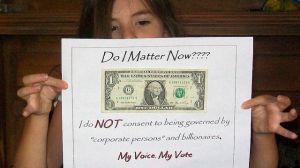Then on June 25, 2012, the Supreme Court ruled, in a 5-4 decision, that its now-infamous Citizens United ruling applied not only to federal election rules, but to state campaign finance laws as well. And that began a wave of corporate contributions to candidates and PACs — and to dark money groups that aren’t required to disclose their donors.
But on Monday, the Texas Ethics Commission approved new rules designed to shine some sunlight on that latter category. David Saleh Rauf reports for the San Antonio Express-News:
The Texas Ethics Commission in a unanimous vote Wednesday approved a new regulation to require politically active nonprofits to start disclosing donors if they spend more than 25 percent of their annual budget on politicking.
The measure takes aim squarely at so-called dark money groups that are allowed under federal rules to play in the political arena without having to disclose where their money comes from.
“In Texas, where there are no limitations on contributions or no limitation on expenditures, disclosure is the only protection the public has,” said commission Chairman Jim Clancy, who was appointed by Gov. Rick Perry.
The move marks the first-ever regulation of dark money in Texas. Several other states — including California, New York and Utah — have put in place measures of their own to bring secret campaign cash out of the shadows.
But the Texas regulation comes just months before the Legislature convenes, teeing up a new fight on the issue after Perry vetoed a dark money disclosure bill last year.
As we noted shortly after the Supreme Court issued its decision in McCutcheon, conservatives had long touted disclosure laws as an alternative to limits on political spending. Prominent Republicans like Senate Minority Leader Mitch McConnell (R-KY) “preached that disclosure was the Holy Grail of campaign finance reform — the perfect way to balance the rights of the wealthiest to engage in politics with the public’s interest in not having the voices of ordinary citizens drowned out by megaphones wielded by billionaires.” But all that changed with the emergence of dark money groups — one area of campaign financing where conservatives dominate. That’s true in Washington, and as Rauf reports, it’s the case in Texas as well:
Conservative lawmakers and activists have taken to criticizing the commission as overstepping its authority for diving into the topic.
“The Texas Ethics Commission has moved forward with unconstitutional rules,” said Michael Quinn Sullivan, who heads the nonprofit Empower Texans, the biggest-spending dark-money group in the state.
Even before Wednesday’s hearing, the commission was put on notice last week by one newly elected member of the state senate and five Republican nominees to the upper chamber, who wrote to oppose the regulation. Their message: Back off and leave the issue for the Legislature to handle.
Commissioners addressed some of the public criticism, saying that they are simply following guidance from the Legislature to require disclosure on political contributions.
Read the rest of Rauf’s report at the San Antonio Express-News.


